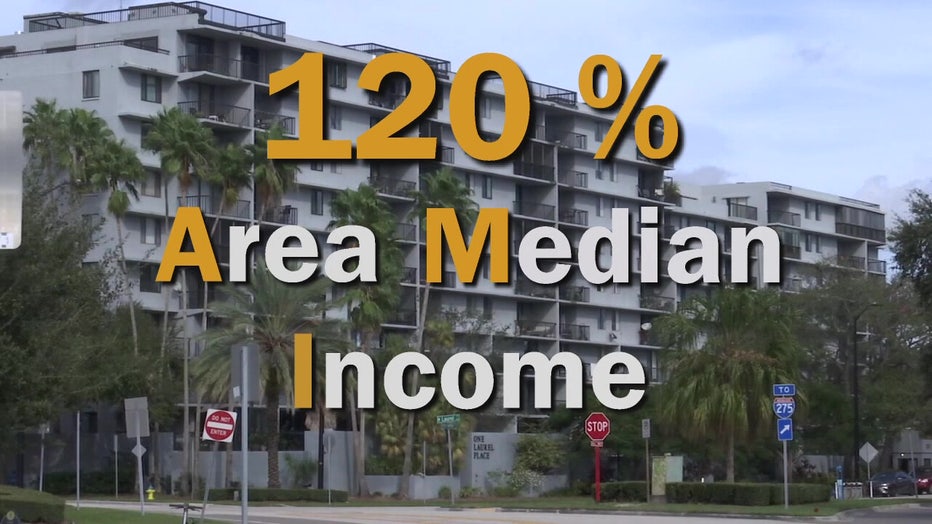Florida's affordable housing crisis: The missing middle part 4 of 4
Inside Florida's affordable housing crisis: Part 4
FOX 13 Chief Political Investigator Craig Patrick dives into the Florida's affordable housing crisis and how the passed reforms in zoning and taxes that have yielded little benefit to homeowners and renters.
TAMPA - Florida passed reforms in zoning and taxes to try to make homes more affordable, but it's not paying off for many like Becky Robinson.
She has little time between washing clothes and cleaning up around the house after working some 50 hours a week as a home health aide.
"It's hard to think that I'm in my late 50s and I don't have anything," she said. "And that's with us splitting the rent four ways, because that's the only way we can live."
She lives on a diet of ultra-processed food and skips meals to save money.
"I prefer to eat healthy, but everybody knows that healthy costs more," Robinson said. "I normally eat about once a day so I can help conserve the resources that we do have."
She makes $15 an hour caring for others before taxes with no health insurance.
READ MORE: Florida's affordable housing crisis: proposed solutions
"I can't even think about insurance right now because that would take the place of food," she noted. "And that's what, 15 years-experience in the field."
After caring for fragile seniors by day, she house-sits at night for a few extra bucks.
She worries her lease of $2500/month ($625 split four ways) won't last, because the landlord may not extend the lease.
"And if they don't, I don't know where we will wind up. There's literally nowhere for us to go. The housing has gone through the roof. You can only work so many hours in a day "
Sahe said it would cost too much for her to move somewhere else with all the deposit requirements. Like many who want to stay in the Tampa Bay area, she would make too little to move, and too much to qualify for public assistance.
"One of the most affordable places I found is like $4,800 just to move in. And I have no idea outside of winning the lottery, where I would come up with $4,800 just to be able to put my shoes inside the door." Said Robinson.
They're what state lawmakers call the missing middle.
That inspired the Live Local Act of 2023. It offers subsidies and property tax breaks to developers who cap rent on some of their apartment units.
However, they set the rent cap based on 120% of an area's median income and by area they mean county. So, in Pinellas County, higher incomes along the beaches, Northeast St. Pete and elsewhere drive up that median income. Same goes for South Tampa in Hillsborough, and so on. It creates a situation in which the state gives developers subsidies and tax breaks for affordable housing at 120% of AMI-- which means they can charge up to $2,500/ month for a two-bedroom unit.

Florida's affordable housing crisis part four: The missing middle
It's too much for many Becky, and in that price range urban planners say it not filling a shortage of homes.
"There's actually a surplus in the Tampa Bay region of 120%. AMI housing," said Pinellas County's principal planner Jared Austin.
Meanwhile, the state law also preempts some local government control over zoning.
"It gets a lot of people very frustrated when they say that there's no local control of how their city is actually being developed," said St. Petersburg City Councilman Richie Floyd.
The state made some revisions. For example, it now allows some local governments to opt out of some of the property tax breaks.
READ MORE: Florida’s Affordable Housing Crisis: The Troubled Path part 1 of 4
It also banned qualifying developers from building within 10,000 feet of an airport. While the goal is to bring down housing costs in high-priced urban cores, that new airport restriction excludes quite a bit in the high-priced urban cores.
"Absolutely. I have probably a dozen projects that were in the pipeline. And then after that legislation came along that the projects just died because they don't qualify anymore," said real estate attorney Jake Cremer.
A company called LandTech analyzed the maps of Tampa and the other top four markets in Florida to see exactly how much land that airport amendment excluded.
"There was a reduction of about 22% of the viable sites that first came forward," said LandTech CEO Johnny Britton.
Cremer said Live Local Act, is still producing results and could deliver more with additional revisions.
"It's a great start. It is, probably the most aggressive legislation in the country right now. But we can, we can always improve it, and we should," Cremer said.
Former State Senator and Florida Policy Project President Jeff Brandes hopes state lawmakers will make changes, and commission some independent research before they do.
"Nobody would want to go to their doctor, and let them say, let's try it and see what happens if they had no research to back it up," he said. "Most of your legislators are an inch deep and a mile wide when it comes to public policy. And, and there hasn't been a focus on housing or insurance, or really knowledgeable or curious legislators that want to dig in and find these solutions."
STAY CONNECTED WITH FOX 13 TAMPA:
- Download the FOX Local app for your smart TV
- Download the FOX 13 News app for breaking news alerts, latest headlines
- Download the SkyTower Radar app
- Sign up for FOX 13’s daily newsletter

